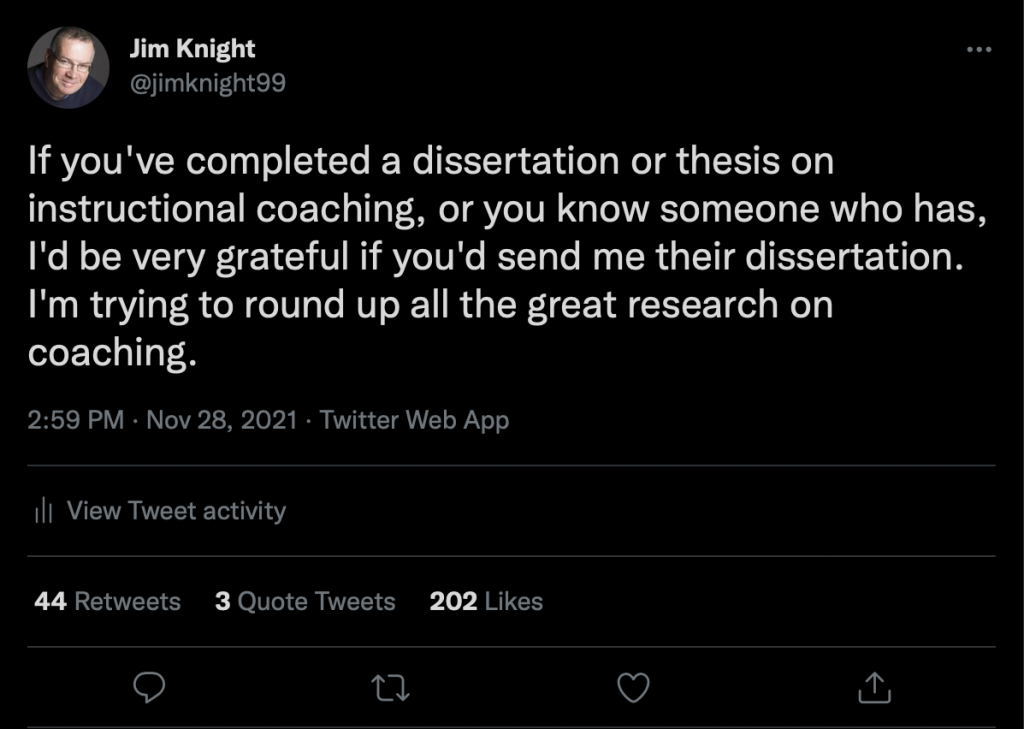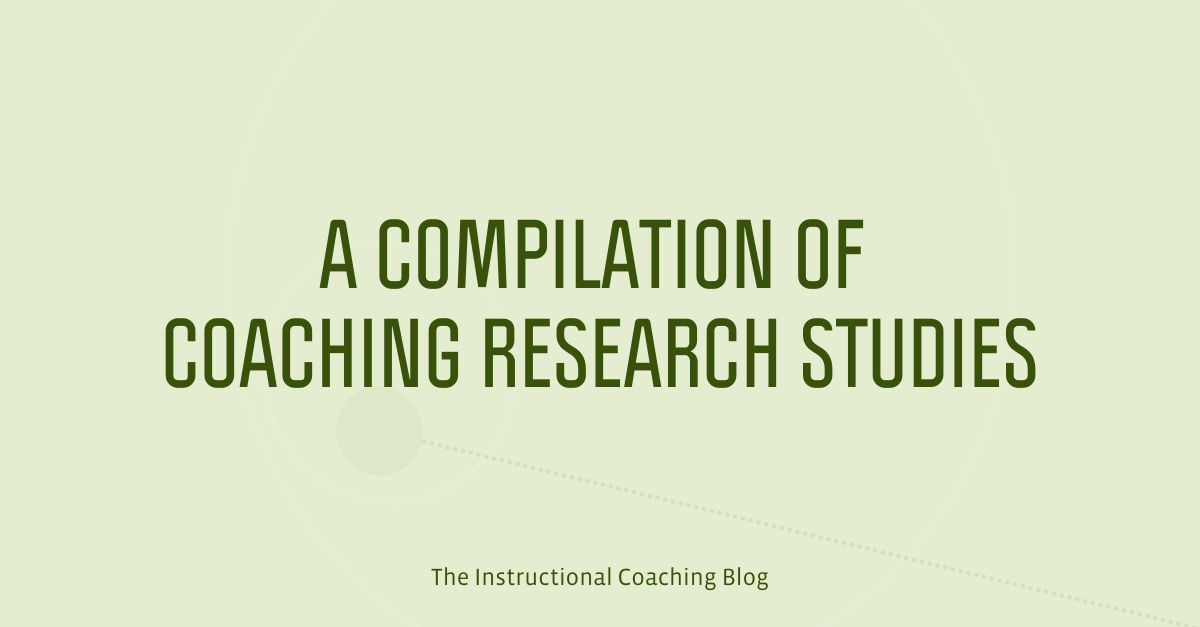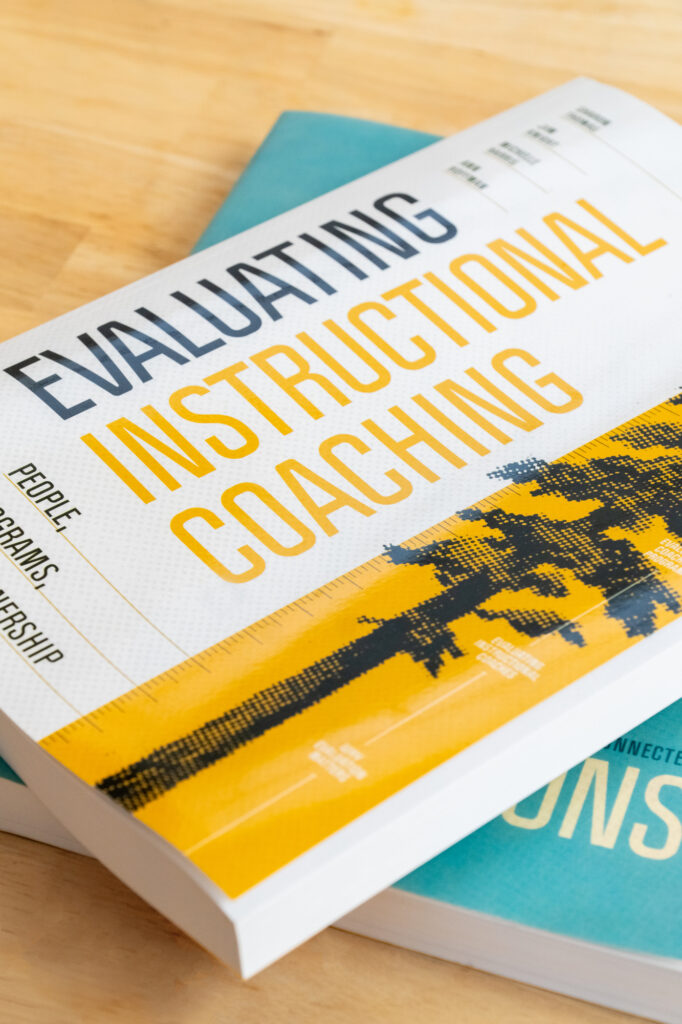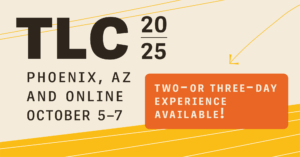A couple weeks ago, Jim Knight tweeted that he was trying to round up all the great research on coaching, and he encouraged followers to share their dissertations or theses. The response has been incredible!
Jim received a lot of requests to share what people sent, so we’ve spent this time compiling all of this amazing research — some from colleagues we’ve known and partnered with for years as well as others we are just engaging with for the first time — into one summarizing list. While ICG has always made our 20+ years of research available on our Research webpage, this brand-new list branches out to include all of the best coaching research being conducted outside of ICG that we could find.

The Impact of Instructional Coaching on Teacher Competency, Job Satisfaction, and Student Growth by Rebecca A. Frazier
“Pre and post instructional survey results from 139 teachers on instructional competency and job satisfaction, and student growth data from 30 teachers’ classes over the course of two years were analyzed using a first differencing statistical approach. In both studies, coaching was found to produce a statistically significant positive impact.”
Teacher Empowerment Through Instructional Coaching: A Qualitative Study on the Theory and Application of Partnership Principles by Aviva Goelman Rice
“The survey findings indicate that instructional coaching can contribute to empowerment, but that it can also lead to teachers feeling disempowered. Analysis of the interviews revealed important themes about teacher-coach relationships, teacher engagement with the coaching process, how coaching improves instruction, and how addressing teachers’ professional learning needs supports their empowerment, all of which can inform the work of instructional coaches.”
Critical features of effective coaching for early childhood educators: a review of empirical research literature by Catriona Elek and Jane Page
“The comprehensive review… confirmed that observation, feedback, goal-setting and reflection are common elements of successful coaching programmes. Analysis of the structures and processes of successful coaching interventions identified that in order to bring about practice change, the amount and content of coaching should be aligned with educators’ characteristics, skills and contexts. It further confirmed that effective coaching should allow educators opportunities to apply new skills, and support them to reflect on their practice and set self-directed goals.”
Perspectives of Elementary Teachers Implementing Blended Learning While Participating in Virtual Coaching by Jessica Kristin Anderson
“Results indicated teachers at higher modes of cognitive processing and higher levels of technology innovation found virtual coaching useful for (a) the implementation of technology tools and strategies, (b) for shifting instructional practices for student impacts, and (c) for reflective practices for professional growth.”
An Autoethnography of a (Reluctant) Teacher Leader by Melinda C. Knapp
“This paper describes how one middle school mathematics teacher learned to enact leadership through an informal role as a teacher leader. The results of this autoethnographic study also reveal how the teacher’s view of leadership changed during the year of the study.”
Focusing on Teacher Learning Opportunities to Identify Potentially Productive Coaching Activities by Lynsey K. Gibbons and Paul Cobb
“Drawing on the preservice and inservice teacher education literatures, we present a conceptual analysis of learning activities that have the potential to support mathematics and science teachers to improve practice.”
Content-Focused Coaching: Five Key Practices by Lynsey K. Gibbons and Paul Cobb
“In this article, we report an exploratory case study that examined a mathematics coach who consistently engaged teachers in coaching activities that had the potential to support their development when she worked with them one-on-one in their classrooms. In presenting an analysis of the coach’s design of coaching activities, we describe five aspects of her planning practice and delineate the knowledge implicated in those practices.”
Coordinating Leadership Supports for Teachers’ Instructional Improvement by Lynsey Kay Gibbons, Anne Garrison Wilhelm, and Paul Cobb
“To examine coordination, we selected cases in which coaches were or were not successful in interacting with teachers around teaching mathematics. We then analyzed the data within and across each of four cases. In schools where coaches were identified as successful in interacting with teachers, principals and coaches coordinated their work across three settings in order to jointly support teachers: teacher collaborative meetings, classroom visits, and coach–principal informal meetings. This study contributes to the literature on leadership by specifying how principals and coaches can coordinate their individual and collective work to organize supports for teachers.”
Understanding the Use of Instructional Coaching to Support Cooperative Learning in the Secondary Classroom by Adam Roubitchek
“The results indicated that instructional coaches demonstrated a strong adherence to the Knight model. In addition, correlations were found between various measures of cooperative learning and the instructional coaching partnership principles of equality, choice, dialogue, praxis, and reciprocity.”
Developing collective capacity to improve mathematics instruction: Coaching as a lever of school-wide improvement by Lynsey K. Gibbons, Elham Kazemi, and Rebecca Lewis
“The coach helped to dramatically transform a recent history of poor performance and deficit-oriented narratives pertaining to the school and its children. Through a fine-grain analysis, we illustrate the coach’s work implicated in supporting groups of teachers to come to mutual understanding around and further development of shared high-quality instructional practices.”
Critical Friends Groups: Building Teacher Knowledge Through Collaboration and Reflection by Michaelann Kelley
“This dissertation illuminates the concept of Critical Friends Groups, situates Critical Friends Groups in the context of the literature, examines Critical Friends Groups and analyzes collaboration and reflection of a single group through the lens of a knowledge community as defined by Craig (2007), and lays the groundwork for future research agendas in promoting teacher empowerment in professional development.”
How Do Pre-Service Teachers Learn? Using Rigorous Research Methods to Inform Teacher Preparation Policy by Anandita Krishnamachari
“Together, the three chapters provide much needed evidence on the role of personal beliefs, attitudes and perceptions in how pre-service teachers learn during the preparation phase, the efficacy of providing them with targeted supports while they are learning and the promise of using robust data and rigorous research designs to inform teacher preparation policy.”
An Investigation of First-Year Teacher Induction Programs in Jesuit Secondary Schools within the California Province by Justin James Dixon Christensen
“Overall, the study revealed that all five schools developed and implemented some form of an induction program for their first-year teachers during the 2012-2013 academic year. The perception data indicated that all five schools demonstrated a strong commitment to (b)Formation of the Ignatian educator. In contrast, the respondents reported the most need for growth in (e)Program assessment, evaluation, and accountability. The respondents showed modest support for the remaining nine standards, indicating the potential for improvement.”
Teachers’ Perceptions on the Effect of the Instructional Coaching Partnership in Teaching Science by Lionel Conteras
“The purpose of this qualitative case study was to gain a clearer understanding of the experiences between elementary school teachers and instructional coaches. The sample population included six teachers and two instructional coaches. Data collection instruments involved one-on-one interviews and a focus group. Implications from this case study suggest a need for significantly additional support for this type of partnership to help increase teacher preparedness in the elementary science classroom.”
What Makes Mathematics Teacher Coaching Effective? A Call for a Justice-Oriented Perspective by Samantha A. Marshall and Patricia M. Buenrostro
“Broadly, we find that four programs of research have developed, investigating: (a) coaches’ activities and relationships, (b) the effects of coaching on student assessment scores, (c) the effects of coaching on teachers’ practices or behaviors, and (d) the effects of coaching on teachers’ knowledge or beliefs. From this analysis, we argue that justice-oriented perspectives of teaching, in tandem with sociocultural theories of teachers’ learning, could allow for more nuanced investigations of coaching and could support design of learning experiences for teachers that bring us closer to educational justice.”
Making mentoring match: mentor teachers’ practical knowledge of adaptive mentoring by G. van Ginkel
“Through questionnaires and interviews, the study elicited four components of mentor teachers’ practical knowledge of adaptive mentoring: 1) their mentoring conceptions, 2) their knowledge of mentoring activities, 3) their knowledge of novice teacher learning, and 4) their heuristics for responding to specific mentoring situations. Findings show that adaptive mentors focus on novice teacher construction of practical knowledge of teaching, and that confronting novices with problems is a central activity of adaptive mentoring.”
Sharing in Instructional Leadership of Literacy: The Elementary School Principal by Anastasia Gruper
“Through semi-structured interviews with principals, an analysis of resumes, and a teacher questionnaire, findings of the study posit that learning is acquired through communities of practice in a variety of settings: school, educational institutions, and educational organizations. Principals participate in deep learning in specific areas of literacy throughout their career in a variety of settings. They use their knowledge, along with the literacy expertise of others, to grow communities of practice within their schools––creating ongoing professional development. The dialogue amongst the community offers new learning and builds trust amongst members.”
Zoom: The Changing Nature of Middle School Shared Instructional Leadership on the Way to the Common Core by Ann M. Yanchura
“The findings support the extant research that illustrates the complexities of instructional leadership: while all the participants had a good understanding of their own instructional leadership responsibilities, their enactment of these was carried out in varying degrees due to the culture of the district, their confidence in the subject matter, as well as the time that the participants were able to commit to the new learning required by the Common Core State Standards.”
Walking the Tightrope: Balancing the Practices of Instructional Coaching with the Role of Administrative Leadership by Ronald Christopher George
“The data did support that administrators who have a background with instructional coaching do have the opportunity to engage teachers in purposeful practice, however, contextual factors did arise that produced mixed results for each participant.”
Positioning and Repositioning: Developing Teacher Identities for a More Positive Positioning of Students Learning English by Laurie Robinson
“The key findings revealed the importance of continued professional learning and the need to create structures for reflection that encourage a more asset-based orientation toward students learning English. Additional findings suggest the need for instructional coaches to be well-trained, diverse, and conscious of their own professional identities. The recommendations from this study call for leadership to promote a school culture centered on the promotion of more affirming educational experiences for secondary students learning English.”
The Relationship Between Instructional Coaches and Principals by Lani S. Norman
“Investing in training and relationship development and examining the principal behaviors that impact the IC’s work with teachers can maximize the IC’s effectiveness and their own value, resulting in a greater impact on student achievement.”
My Teaaching Partner-Secondary: A video-based coaching model by A. Gregory, E. Ruzek, C. A. Hafen, A. Yee Mikami, J. P. Allen, and R. C. Pianta
“The paper presents the guiding theory of MTP-S and how it relates to key components of the coaching cycle. We then offer a brief synthesis of research demonstrating its effectiveness in raising achievement, promoting positive peer interactions, and reducing racial disparities in teachers’ discipline practices.”
Instructional Coaches’ Perceptions of Skills and Teacher Self-Efficacy across Content Areas in a K-12 Setting by Whitney Brooke Goostree
“The purpose of this causal-comparative study was to determine if instructional coach self-efficacy significantly impacted teacher self-efficacy in a suburban district in a southern state.”
Courage to Love: Coaching Dialogically Toward Teacher Empowerment by Heather Wall and Michelle Palmer
“In this article, the authors explore Paulo Freire’s conditions for dialogue as a tool for creating empowering, effective collaborations between instructional coaches and teachers.”
Changing Language, Changing Beliefs: Becoming Reflexive about Coaching Discourse by Heather McLeod Wall
“This participatory action research study engaged three coaches and the researcher in collaborative discussions about their videotaped coaching sessions… Implications drawn from three articles point to the importance of community building, discourse strategies, and enhanced reflexivity for instructional coaches in schools.
A Constructivist Grounded Theory Study on the Structures of Successful Instructional Coaching Programs by Jenna Moller
“While individual programs varied, the findings from the study support that successful instructional coaching programs share the same elements: (a) a clear vision and definition of coaching that all staff understand, (b) coaching is optional, driven by the teacher, and manageable, (c) coaches are hired intentionally, and they are visible, (d) an administrator who oversees the coaches and provides ongoing learning, (e) coaches have strong people skills, engage in dialogue, listen, build trust, and build the confidence of clients, (f) coaches “get into the thick of it,” and (g) coaches check-in consistently with teachers and administrators.”
—-
Know any other research you think should be included on this list? Let us know in the comments!
Visit our Research page for even more research on instructional coaching by Jim Knight and many other influential authors.





























